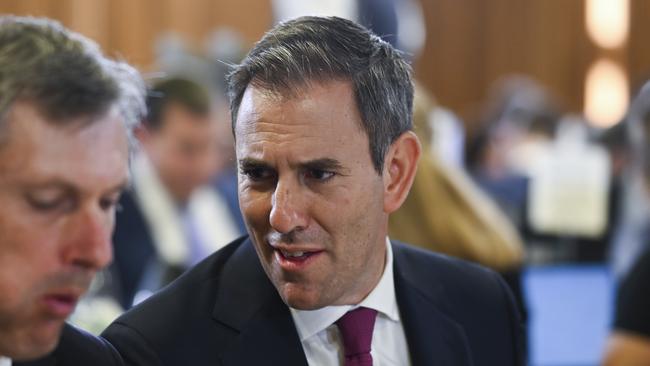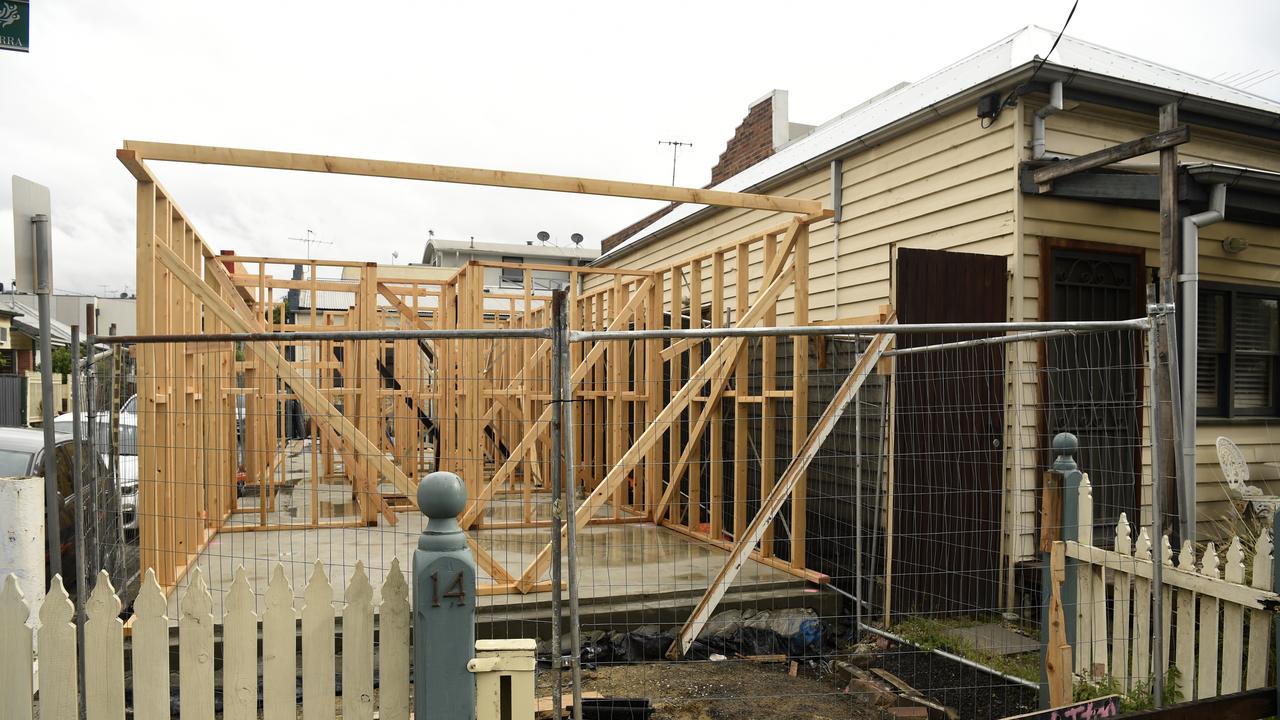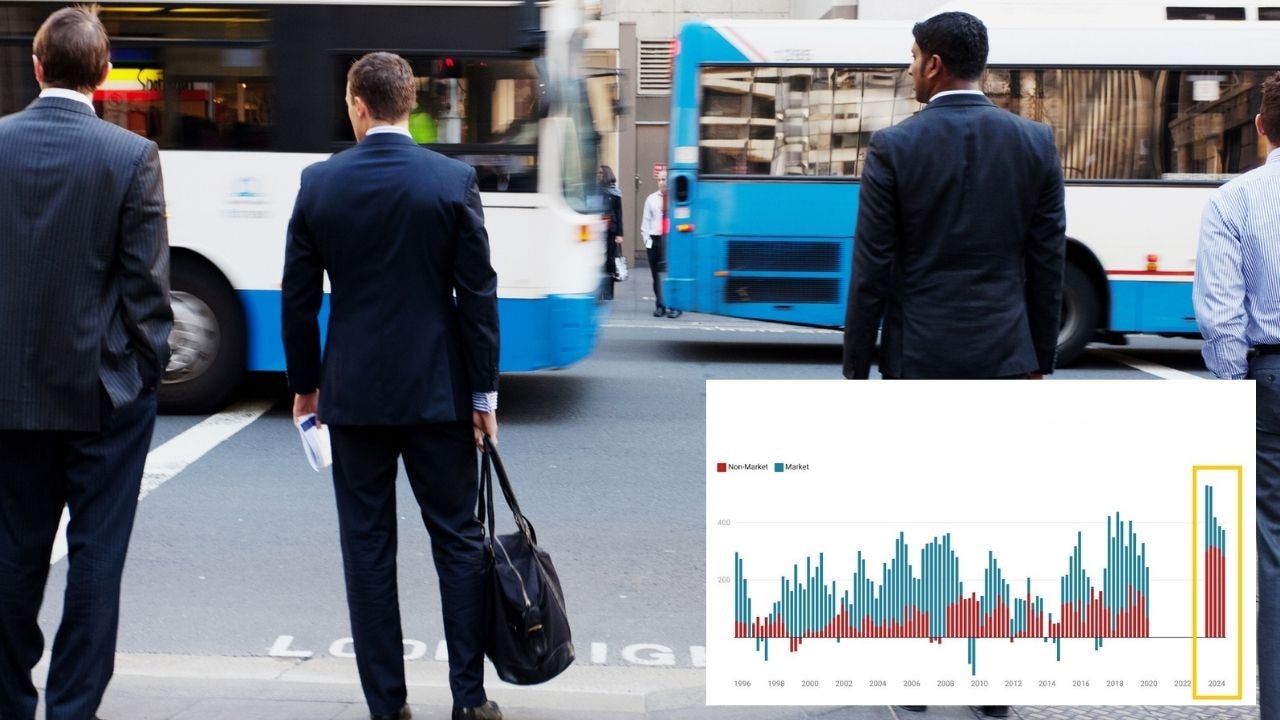Anthony Albanese defends tax cut broken promise at National Press Club
The Prime Minister faced a grilling over his call to break a major election pledge on the stage three tax cuts.

News
Don't miss out on the headlines from News. Followed categories will be added to My News.
Anthony Albanese has stopped short of admitting he broke an election promise as he accepted responsibility for the decision to remodel the stage three tax cuts.
Speaking to the National Press Club on Thursday, the Prime Minister also confirmed the Australian Competition and Consumer Commision would conduct a year-long inquiry into the supermarkets.
Mr Albanese flagged there would be further cost of living relief included in the May budget.
“These broader and better tax cuts are not the beginning of our actions on cost of living – and they will not be the end,” told reporters in Canberra.
PM SAYS GOVT HAVE BEEN ‘VERY UPFRONT’ ON TAX CUTS
The Prime Minister has consistently and repeatedly said his position on the tax cuts, which are due to flow from July 1, “had not changed”.
But on Thursday, Mr Albanese confirmed he had changed his tune. He unveiled his plans to slash tax cuts for higher income earners in favour of bigger breaks for those earning $150,000.
“For me, our responsibility is clear. This is the right decision, not the easy decision,” he said.
Labor opposed the tax cuts when they were first legislated by the Coalition in 2019. But after its amendments failed, it ultimately waved them through, and promised to keep them unchanged at the 2022 election.

The Prime Minister conceded his position had changed.
“I am very clear about the fact we have changed our position, we have changed our position for the right reasons,” he said.
“I stand by and accept responsibility for it.
“I am not trying to argue that it is not a change of position. As we have kept as much consistency as possible, by keeping the same amount there, but done it in a way that recognises the reality which is there.”
The reworked cuts will lower the tax rate on incomes up to $45,000 to 16 per cent – down from 19 per cent – and lower the $45,000 to $135,000 tax bracket to 30 per cent – down from 32.5 per cent.
Additionally, the 37 per cent tax bracket will be retained between $135,000 and $190,000, above which the top marginal tax rate will then kick in at a 45 per cent rate.
The changes will neuter the third stage of the Morrison government’s tax package – designed to address bracket creep – which would have abolished the 37 per cent tax bracket on income earned between $120,000 and $180,000.

Instead, a 30 per cent tax rate would have applied to all earnings between $45,000 and $200,000, with a 45 per cent rate on all earnings above this level.
As a result of Labor’s tax package, roughly one million taxpayers who earn in excess of $150,000 a year will be up to $4546 worse off than they otherwise would have been.
CIRCUMSTANCES HAVE CHANGED
The Prime Minister defended breaking his election promise by arguing the changed economic conditions had forced his hand.
Over summer, Treasurer Jim Chalmers was tasked by the government to advise on options for providing cost-of-living relief for Australians.
The advice said the stage three tax cuts were designed in “when dramatically different circumstances were expected to unfold”.
“Since they were legislated, the global economy has been impacted by several significant, unanticipated shocks,” the document said.
“Cost-of-living pressures have disproportionately impacted low- and middle- income households because these households have less capacity to absorb rising prices for essential spending (such as food, healthcare, rent or mortgage repayments) by reducing discretionary spending or drawing down savings.
“Working households have experienced the fastest rise in their cost of living, with prices rising 9 per cent through the year to the September 2023.”
Mr Albanese argued that by making the hard choices in the government’s past two budgets, and delivering the first budget surplus in 15 years, there was now wiggle room to remodel the tax breaks.

ALBO DODGES QUESTIONS ABOUT TAX BRACKETS
Asked about the reliance of the tax system on income tax and his government’s plans to address bracket creep, Mr Albanese was evasive and instead pointed to the record of the previous Coalition government.
“The previous mob sat there for a decade, didn’t do anything about it,” Mr Albanese said.
“They could have had the option, we are saying here that this will be legislated on July 1.”
The government’s updated tax package will bring in an additional $28 billion of revenue over the next decade as a result of the retention of the 37 per cent tax bracket and inflation pushing taxpayers into higher tax brackets.
‘WE NEEDED TO DO MORE’: ALBO CONFESSEED
Mr Albanese defended the timing of the tax overhaul, arguing that the government’s previous measures to address the cost of living didn’t necessitate bringing forward the changes from July 1.
Citing energy price relief, changes to lower the cost of medicine and providing 180,000 fee-free TAFE places, he claimed that his government had, until the start of the year, done enough to support the cost of living crunch.

“What became clear though, is that we needed to do more,” Mr Albanese said.
Mr Albanese said after his realisation, he had requested that Treasury and Finance officials provide suggestions for further assistance to address the increased cost of living.
“We’re keeping the amount of the tax cuts that were envisaged, but doing it in a way that helps lower and middle income earners … This is good economic policy,” he said.
CONFIDENT TAX CUTS WILL PASS: ALBO
With the government’s proposed tax changes facing a final hurdle in federal parliament, Mr Albanese assured the audience it would be passed into law.
“We’re confident that it will be carried by the parliament,” Mr Albanese said, claiming that the government was right in its decision despite its detractors.
“One plan, that the Coalition says, and before they even look at our plan - they are saying no, but they also say that they will legislate to reverse it if they are elected,” Mr Albanese said.
“I’m sure that there will be some who will say it does too much or doesn’t do enough.”
PROTESTERS GATHER OUTSIDE NATIONAL PRESS CLUB
As the Prime Minister was attempting to sell his reform, protesters who gathered out the front of National Press Club tried to drown him out.
There were two groups who gathered outside of the NPC venue in Canberra - those calling for an end to coal and gas and pro-Palestine supporters.
While they weren’t allowed inside the room, at one point during Mr Albanese’s speech, they had pointed in the right direction outside the building and those at the lunch were able to hear the sounds of their chants in the room — albeit if quite muffled.
It didn’t distract Mr Albanese, however, as he continued on with his address.

BOMBSHELL PROBE INTO SUPERMARKET PRICES
The Albanese government will instruct the competition watchdog to scrutinise the supermarket industry amid accusations of price gouging.
The 12-month probe, which will be conducted by the Australian Competition and Consumer Consumer Commission (ACCC), will examine whether supermarkets have used their market power to expand their profits, and pressure consumers, farmers and suppliers to bolster their bottom line.
Woolworths, the nation’s largest supermarket chain, together with its main competitor Coles, make up two-thirds of Australia’s food and grocery market.
Both companies have regularly defended their pricing, claiming they too are affected by cost pressures from suppliers and their workforce.
The changes were announced alongside a broader cost of living relief package, which included an overhaul of the contentious stage three tax cuts, by Prime Minister Anthony Albanese at an address to the National Press Club on Thursday.
The ACCC has significant powers – and it is the best and most effective body to investigate supermarket prices,” Mr Albanese said in his first major address of 2024.
The supermarket industry will also be subject to a Greens-led parliamentary inquiry, as pressure grows on the sector which has recorded near-record profits, while consumers struggle amid the ongoing inflation crunch.
Mr Albanese said the inquiry will investigate online shopping, loyalty programs and how technological change has affected competition in the industry.
Amid accusations that lower prices paid by retailers at the farm gate aren’t flowing through to final prices, the ACCC will also be directed to scrutinise whether consumers and primary producers are receiving a fair deal.
“When farmers are selling their product for less, supermarkets should charge Australians less,” Mr Albanese.
Under Australian consumer law, high grocery prices are only prohibited by competition law when there is unlawful communication between the parties to coordinate pricing.
The government also unveiled funding for consumer advocacy organisation, CHOICE to provide clear and regular information on prices in Australian supermarket outlets.
“Across thousands of products it can be hard for people to find the best deal,” Mr Albanese said, adding that the funding would promote “transparency, enhance competition and drive value.”
Originally published as Anthony Albanese defends tax cut broken promise at National Press Club


